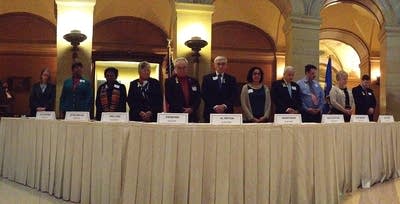Some Minn. lawmakers want to make Electoral College irrelevant
Go Deeper.
Create an account or log in to save stories.
Like this?
Thanks for liking this story! We have added it to a list of your favorite stories.

As members of the Electoral College gathered across the nation Monday to make official the state-by-state results of this year's presidential contest, supporters of a national popular vote campaign called for a new method of deciding the presidential race.
This year, Minnesota's 10 electoral votes went to President Barack Obama, who defeated Republican nominee Mitt Romney in last month's election. Under the current system, the candidate who wins a state's popular vote generally wins all of its electoral votes. The candidate who wins 270 of the nation's 538 Electoral College votes claims the presidency.
State Sen. Ann Rest, DFL-New Hope, and State Rep. Pat Garofalo, R-Farmington, are among those who want to change the process by awarding each state's electoral votes to the candidate who wins the most popular votes in all 50 states and the District of Columbia.
Garofalo said the change would guarantee that every vote is of equal value in all states, not just a few battleground states.
Turn Up Your Support
MPR News helps you turn down the noise and build shared understanding. Turn up your support for this public resource and keep trusted journalism accessible to all.
"You look at the facts, you look at the data [and] it's clear that we've had another presidential election where the overwhelming majority of political resources have gone in a small minority of states," he said. "This year, 2012, it was more concentrated than in previous elections."
As prescribed by federal law, Minnesota's 10 electors gathered Monday at the State Capitol to cast their votes for president. Similar events took place in all 50 states.
Secretary of State Mark Ritchie asked all the Democratic electors to announce their choice. As expected, they all supported President Obama.
During the brief ceremony, Ritchie noted that the formal process honors the founding fathers. He said their creation of the Electoral College showed the world that a peaceful transfer of power was possible.
"It has evolved over time," Ritchie said. "But it still represents the best of what we know of our federalist system, and today we have a chance to celebrate that opportunity."
In working to change the way the nation elects a president, organizers of the national popular vote effort stress that they are not trying to eliminate the Electoral College, and that a constitutional amendment is not needed to make the change they seek.
They say the new rules would take effect when states possessing 270 electoral votes enact an identical bill. So far, Vermont, Maryland, the state of Washington, Illinois, New Jersey, Massachusetts, California, Hawaii and the District of Columbia have done so, with 132 electoral votes are on board.
Gov. Mark Dayton, a Democrat, said he too thinks the Electoral College is a dated system, and he would prefer one based on the popular vote. But when asked about the proposed changes, Dayton said he doesn't give them much chance for success.
"It's written in the Constitution," Dayton said of the Electoral College. "No matter what I think about it, I think it will almost certainly be there until I'm pushing up daisies, and maybe my kids and grandkids. I just don't see that there's a chance at least in the near future that it's going to go away. All the small states are absolutely wedded to it."
Still, Dayton said if the Legislature takes a serious look at the bill then he will too. Lawmakers return to St. Paul on Jan. 8, for the start of the 2013 session.
Dear reader,
Your voice matters. And we want to hear it.
Will you help shape the future of Minnesota Public Radio by taking our short Listener Survey?
It only takes a few minutes, and your input helps us serve you better—whether it’s news, culture, or the conversations that matter most to Minnesotans.




